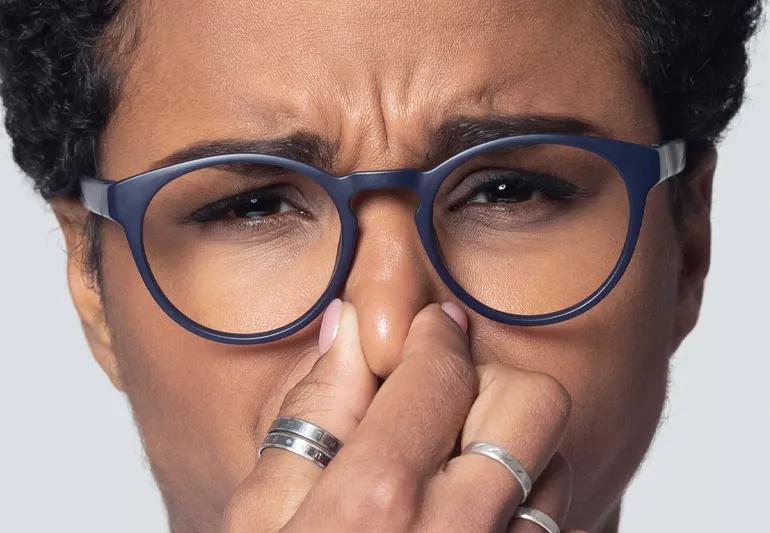Certain foods, medications or even illness could be behind the stink

Image content: This image is available to view online.
View image online (https://assets.clevelandclinic.org/transform/28a5e834-31bc-4197-bdbc-867a6fc137d4/fartsSmell-1213961445_770x533_jpg)
woman holding nose stink
By the time you finish reading this article, it’s possible you unknowingly passed gas. Seriously, it’s true. The average person lets some air escape from their nether regions more than 20 times a day.
Advertisement
Cleveland Clinic is a non-profit academic medical center. Advertising on our site helps support our mission. We do not endorse non-Cleveland Clinic products or services. Policy
Now, 99% of those poofs draw no attention. They’re not loud. They’re not stinky. They’re not toast-your-buns hot.
But then there’s that other 1%. The farts that can clear out rooms.
So, why does some flatulence smell sooooo bad? And are odiferous toots a sign that something troublesome is brewing deep inside of you? For answers, we turn to gastroenterologist Christine Lee, MD.
To understand why farts smell, it helps to know their origin story. Intestinal gas typically forms one of two ways, says Dr. Lee.
Let’s start with the #1 reason for stinky farts: It’s tied to something you consumed.
Gasses that form during your digestive process can be a healthy result of a nutritious diet loaded with fiber-rich foods. Digestion sometimes churns up hydrogen sulfide, which can add a rotten-egg odor to any air biscuit you cook up.
Advertisement
“As people often say, what goes in comes out,” notes Dr. Lee. “That’s a good way to think of what’s behind most foul gas.”
Certain healthy menu items may reintroduce themselves in an unpleasant vapor form hours after your meal. The list includes:
There’s a reason beans earned a label as “the musical fruit.” Many beans are chock full of carbohydrates and sugars that don’t digest easily. Breaking down this fiber-rich food can lead to fermentation and a gas buildup in your gut. A loud and stinky result often follows.
Let’s get realistic: Cooking broccoli on the stovetop gives off a whiff of unpleasantness tied to a high sulfur content. When that food rolls through your digestive system … well, it only raises the stench level, says Dr. Lee.
Broccoli’s cruciferous cousins — Brussels sprouts, cauliflower and cabbage, to name a few — bring similar results.
The following foods contain enough sulfites to draw notice by adding a certain zest to farts:
Protein powders used by athletes or people looking to drop pounds may also cause some eye-burning flatulence. Blame the use of cysteine, a sulfur-containing amino acid that’s often in whey powder.
An intolerance or sensitivity to lactose can create digestive distress and some pretty pungent farts, says Dr. Lee. Consider it the backstory behind the phrase “cutting the cheese” to describe bad gas. (Many kinds of cheese, by the way, have high sulfur content.)
Your body can’t fully absorb many low-calorie sweeteners in diet products, which leaves them sitting in your gut. The resulting gas can be rather rancid.
Ever have a fart that just feels warmer than normal? Odds are it’s because of some spicy food you ate earlier. Basically, the fiery substances that burn your tongue do the same to your bottom while blasting out.
Food may be the main reason for smelly gas, but it’s not the only one. Other sources include:
It’s possible the cause of your stinky farts is just … well, you. The chemistry is different in everyone’s gut, Dr. Lee explains. Yours may just have bacteria that naturally leads to gas that smells a bit stronger.
Taking medications — especially antibiotics — can throw your digestive system into temporary turmoil and even lead to a C. diff infection, notes Dr. Lee. The resulting imbalance can lead to some foul-smelling farts.
A backlog of poop in the chute doesn’t exactly help with fart odor.
Advertisement
Foul-smelling farts usually come and go. If that stench keeps coming, though, it may be a sign that something isn’t quite right inside. Conditions that could cause smelly farts include:
If bad gas continues for an extended period, talk to your healthcare provider to find a cause.
The problem usually takes care of itself if it’s linked to what you ate or medication, says Dr. Lee. The symptoms should disappear once the offending item works through your system. (Provided there isn’t continued usage, of course.)
Over-the-counter digestive aids and regular exercise may help cut down on farts. Changing your diet and avoiding offending foods should also take the wind out of those sails.
On the whole, though, Dr. Lee says passing gas is just part of a regular organic process. But if it’s excessive or smells particularly foul, get checked by your healthcare provider to see if it’s a medical issue.
Advertisement

Delivered every Tuesday!
Sign up for our Health Essentials emails for expert guidance on nutrition, fitness, sleep, skin care and more
It's a letter about the news!
Learn more about our editorial process.
Advertisement
When it can’t pass down south, gas can definitely travel — and get trapped — up north
Fiber gets credit, but don’t let the byproduct keep you from enjoying beans
Excessive flatulence could indicate a digestive issue
Try these tips and tricks to help your baby get rid of gas fast
It’s perfectly normal for gas pockets to ‘evacuate’ during the motions of sex
Gripe water isn’t regulated by the FDA, and research doesn’t support its use
The Short Answer from an emergency medicine physician
Most recommended precautions center around minimizing bruising or swelling
Type 2 diabetes isn’t inevitable with these dietary changes
Applying a hot or cold compress can help with pain
Pump up your iron intake with foods like tuna, tofu and turkey